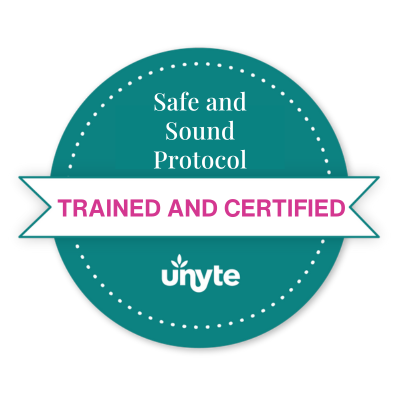
Safe and Sound Protocol (SSP)
Safe and Sound Protocol
SSP now available at Therapy with Michaela
We are pleased to use the Safe and Sound Protocol (SSP) here at Therapy with Michaela. SSP is an innovative addition to psychological treatment. The SSP was developed by Dr. Stephen Porges and is designed to reduce stress and auditory sensitivity while enhancing social engagement and resilience.
Based on hierarchical recruitment of the autonomic nervous system, the SSP trains the auditory processing system to tune into cues of safety signalled by frequencies of the human voice, which stimulates the social engagement system through the neural network associated with listening. The Focus System combines filtered music through air and bone conduction with movement activities, harnessing the power of neuroplasticity to change the brain.
The SSP is a five-hour intervention that helps to calm the physiological and emotional state, which in turn helps to improve communication and make therapy more successful. It is a non-invasive and gentle approach that has been proven to be effective in reducing symptoms of stress, anxiety, and depression. We believe that the SSP is an invaluable tool that can help you and/or your child to achieve greater emotional well-being.
For further information, please visit these links and do not hesitate to discuss this directly with us.
Polyvagal Theory | SSP (1) | What is SSP | Integrated listening
As the listener, all that is required of you during a session is to simply listen to the music and to let your provider know of feelings or sensations, whether emotional or physical, that may arise. Your provider may also have you engage in light activity during your listening sessions, such as stretches, breathing exercises, or drawing. Be sure to stay in close communication with your provider, so they can adjust your listening plan to suit your needs.
Your certified provider will be your guide along your SSP journey. They are trained to make sure that you are ready even before you start listening to the music, and will recommend an individualised listening plan for you. They will provide education, answer all your questions and prepare you for all that you may experience once you begin. During the listening, they will monitor your progress and make sure you are not completing the program too quickly or too slowly. They will support and work with you to find the right pace and conditions for the optimal listening experience for you. If you are a parent or caregiver, you may be the primary listening partner for your child. Follow your provider’s instructions for what activities to do and how to guide your child.


